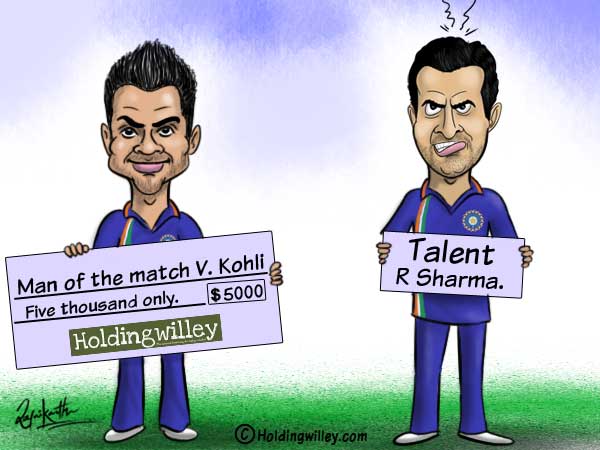 John Locke – English philosopher and physician once famously stated that a person's personality develops through interaction with his environment. The general consensus today seems to be that personality is a combination of genetics and the environment. 'Talent' is considered as an innate entity which everyone possesses. The only difference is the field in which this entity is maximum may vary from person to person.
John Locke – English philosopher and physician once famously stated that a person's personality develops through interaction with his environment. The general consensus today seems to be that personality is a combination of genetics and the environment. 'Talent' is considered as an innate entity which everyone possesses. The only difference is the field in which this entity is maximum may vary from person to person.
In cricket, 'talent' is quite often used and abused (in the case of Rohit Sharma). Often a batsman being able to play a particular shot to a particular delivery is described as 'talent'. The batsman who seems to have more time than others to play a shot is called talented. Bowlers, well, nobody really cares about them. If they possess swing, pace, bounce, spin, they're all talented. If not, they can always learn.
At the highest level, what exactly is talent? One would think, to beat so many people and reach the international team would require talent. A player representing his nation's team should be able to play all the shots in the book or at least be able to practise enough to be able to play it. So what's the difference? Nature and the resulting confidence level.
Practising on flat wickets or concrete wickets enables the batsman to develop 'on the up' shots quite early. Batsmen who are confident or even arrogant, perhaps do not account for any late seam movement or swing and line the ball up. Hence, they seem to possess more time and can play more shots. Other batsmen are a little wary of late movement and hence play the ball late. They have very little time to think of what shot to play and hence end up defending good balls rather than trying extravagant shots. It could be said, they value their wicket more than the chance to execute one good looking shot. (Sachin scoring a double hundred without playing a cover drive springs up as an example).
In ODIs or T20s, every player plays unbelievable shots because lateral movement is an exception in these formats. When the ball does swing and move around, teams have crumbled in the not so distant past.
So, why should a few players be given a longer rope than the others? In the name of talent, can throwing away one's wicket be justified for a few more matches? Is looking good as a batsman more important than hanging in there and scoring runs?
Personally, I think not. In fact, if a player is so talented, he should be given a shorter rope. Why should he require so many matches to prove himself? As they say, talent only gets you so far; the road ahead requires dedication, hard work and a bit of brains.
Not all talented players become great, because after a certain point the definition of talent changes. It becomes much more than looking pretty while playing strokes. It includes looking stupid while surviving. It entails sometimes admitting that my strength isn't strong enough. To do this, the right environment needs to work on the individual's personality.
In the end, bringing my inner Siddhu to the fore, I'd say, 'Talent' is the wave that brings you to shore, not the one that takes you home.